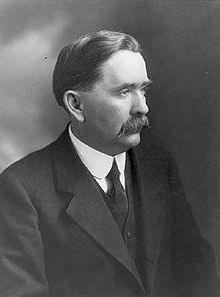John Robert Boyle | |
|---|---|
 | |
| Leader of the Official Opposition in Alberta | |
| In office February 2, 1922 – April 12, 1924 | |
| Preceded by | Albert Ewing |
| Succeeded by | Charles R. Mitchell |
| Leader of the Alberta Liberal Party | |
| In office 1922–1924 | |
| Preceded by | Charles Stewart |
| Succeeded by | Charles R. Mitchell |
| Alberta Attorney General | |
| In office August 23, 1918 – July 18, 1921 | |
| Preceded by | Charles Wilson Cross |
| Succeeded by | John Edward Brownlee |
| Alberta Minister of Education | |
| In office May 4, 1912 – August 26, 1918 | |
| Preceded by | Charles R. Mitchell |
| Succeeded by | George P. Smith |
| Member of the Legislative Assembly of Alberta | |
| In office July 18, 1921 – August 27, 1924 | |
| Constituency | Edmonton |
| In office November 9, 1905 – July 18, 1921 | |
| Preceded by | New District |
| Succeeded by | Samuel Carson |
| Constituency | Sturgeon |
| Alderman on the Edmonton City Council | |
| In office December 12, 1904 – May 7, 1906 | |
| Personal details | |
| Born | February 1 or 3, 1870 or 1871 Sykeston, Ontario |
| Died | February 15, 1936 (aged 65–66) Ottawa, Ontario |
| Political party | Alberta Liberal Party |
| Spouse | Dora Shaw (2 children) |
| Profession | Lawyer |
John Robert Boyle KC (February 3, 1871 – February 15, 1936) was a Canadian politician and jurist who served as a Member of the Legislative Assembly of Alberta, a cabinet minister in the Government of Alberta, and a judge on the Supreme Court of Alberta. Born in Ontario, he came west and eventually settled in Edmonton, where he practiced law. After a brief stint on Edmonton's first city council, he was elected in Alberta's inaugural provincial election as a Liberal. During the Alberta and Great Waterways Railway scandal, he was a leader of the Liberal insurgency that forced Premier Alexander Cameron Rutherford from office.
Though initially left out of cabinet by Arthur Sifton, Rutherford's successor, Boyle was named Minister of Education in 1912. He served in this capacity until 1918, during which time he alienated many non-English speakers by insisting on a unilingual English school system. In 1918 he was made Attorney-General. He retained his seat in the legislature after the Liberal defeat in the 1921 election and briefly served as leader of the Liberal opposition, but was appointed to the bench in 1924. He was still a judge when he died in 1936.